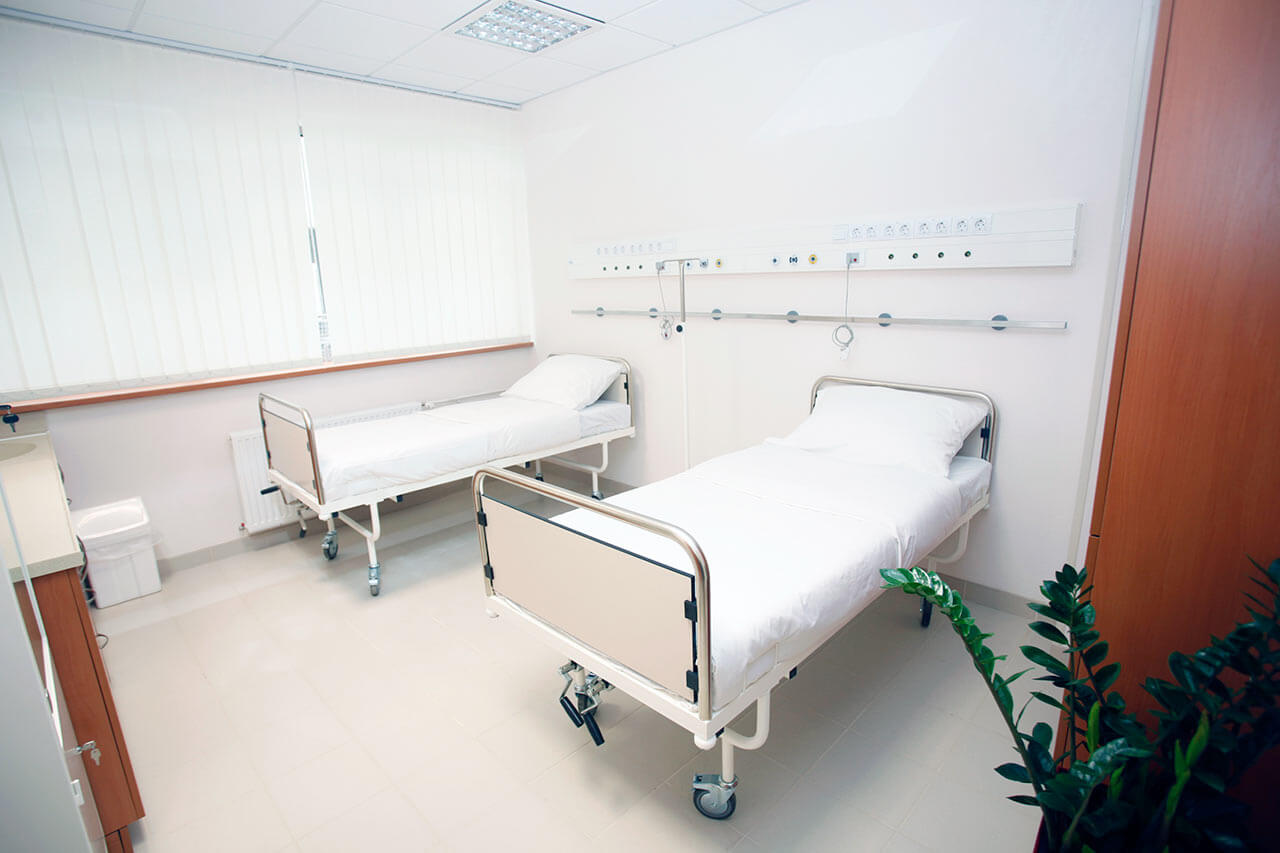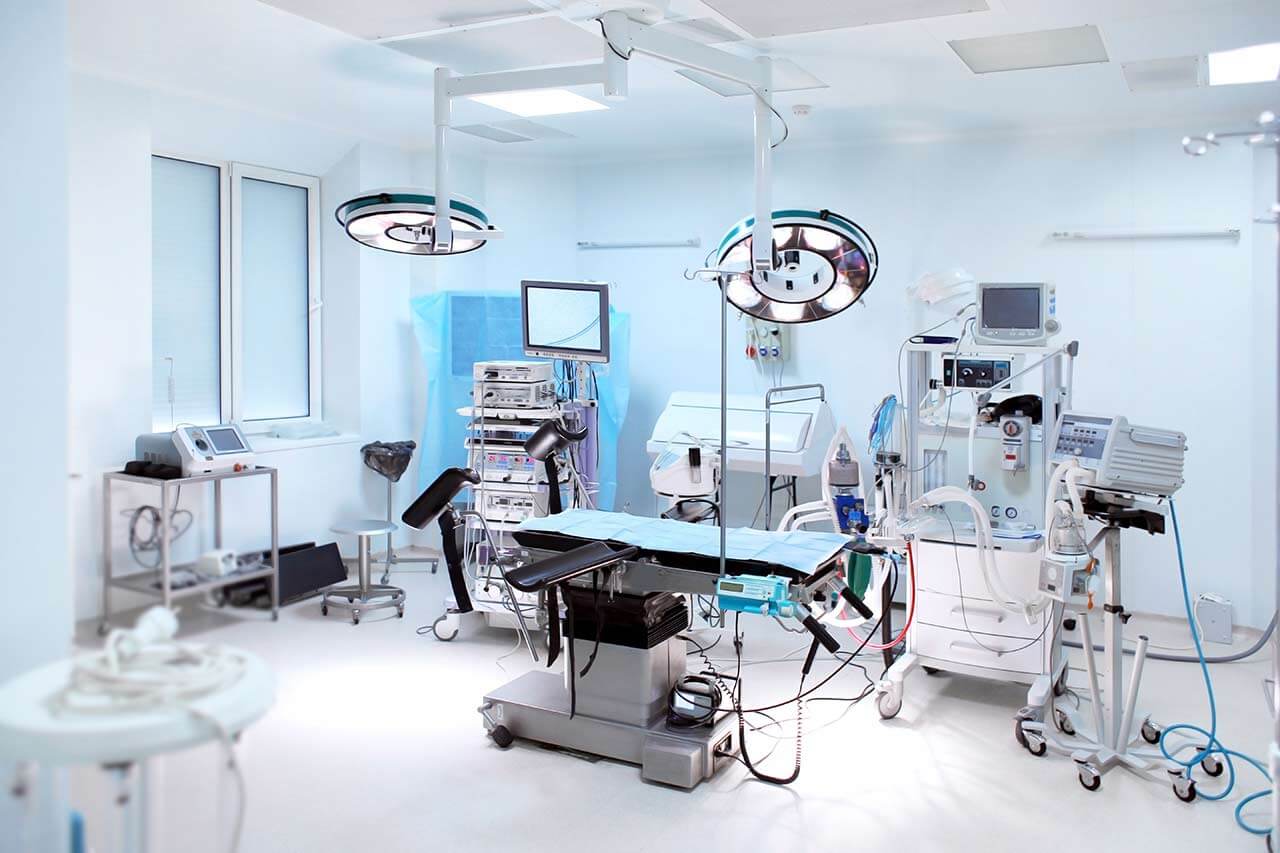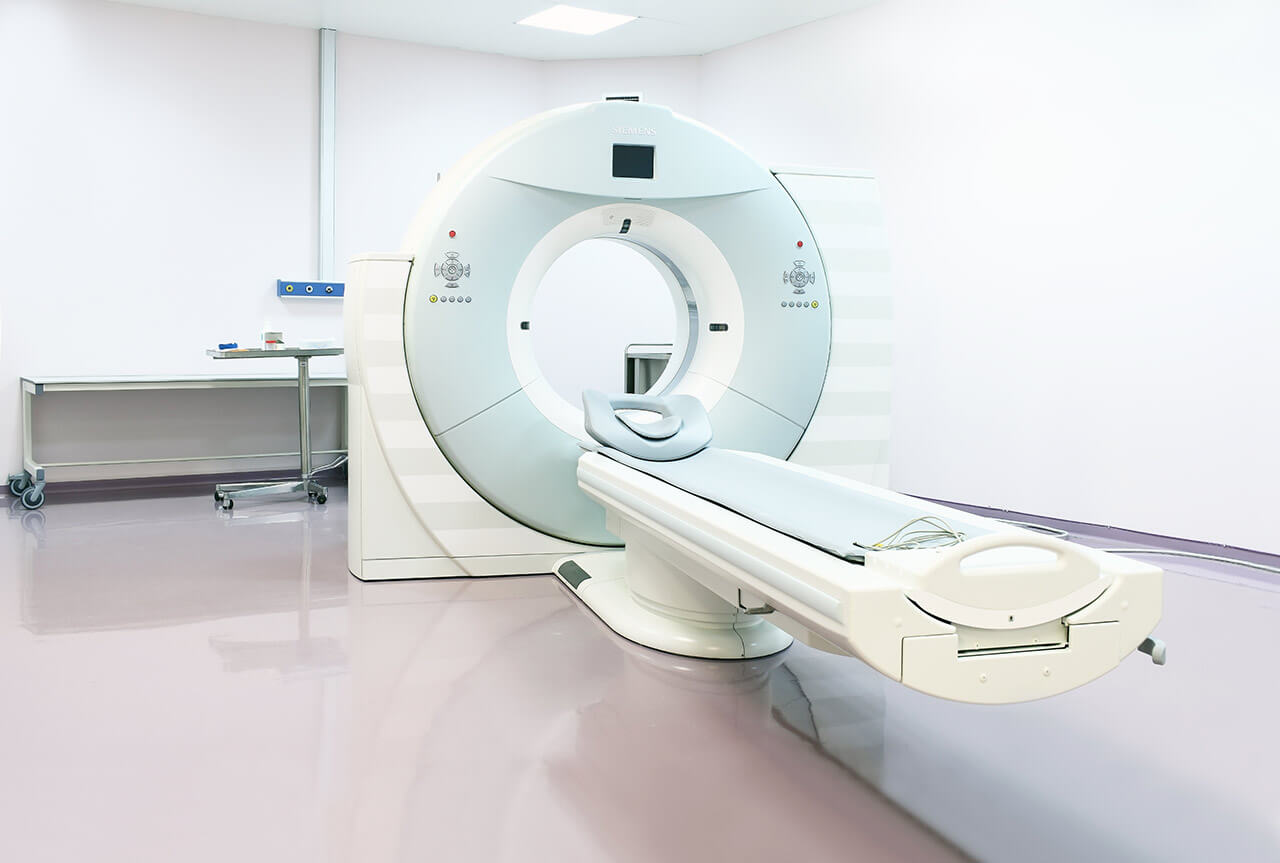
The program includes:
- Initial presentation in the clinic
- clinical history taking
- analysis of medical records
- physical examination
- laboratory tests:
- complete blood count
- biochemical analysis of blood
- TSH-basal
- tumor markers
- inflammation indicators
- indicators of blood coagulation
- ultrasound scan of the abdomen
- CT/MRI scan of the abdomen
- colonoscopy with biopsy, if indicated
- histological and Immunhistochemiсal analysis
- radiation therapy
- chemotherapy
- consultations of related specialists
- symptomatic specific treatment
- cost of essential medicines and materials
- nursing services
- control examinations
- developing of further guidance
How program is carried out
During the first visit, the doctor will conduct a clinical examination and go through the results of previous laboratory tests and instrumental examinations. After that, you will undergo an additional examination, including complete blood count, laboratory assessment of liver and kidney function. Based on the received results, the physician will elaborate the chemotherapy regimen, conduct radiotherapy planning with the help of CT or MRI, make the permanent tattoo marks on the skin and conduct CT simulation in order to assess the accuracy of the rays and the radiation dose. If necessary, related medical specialists will be involved in the elaboration of a treatment regimen (tumor board).
Chemotherapy and radiation therapy are carried out as the day hospital procedure, without mandatory admission to the hospital. At each visit, the physician will assess your general condition and the marks on the skin. After that, you will be placed in a shielded radiation therapy room, on a special table.
Each radiation therapy session lasts less than half an hour (including preparation). All this time, doctors and nurses are monitoring your condition, you can communicate with them through a loudspeaker. The procedure is completely painless. Depending on the planned course of treatment, you will visit the hospital from 1 to 3-5 times a week.
During the chemotherapy session, after the placement of a venous catheter, you will stay in a comfortable ward. An infusion system will be connected to the catheter, through which the required drug or a drug combination will be administered. All drugs are administered by intravenous drip, slowly, so the total duration of the infusion can be up to several hours. All this time, doctors and nurses will monitor your health condition closely.
After the completion of the chemotherapy and radiation therapy course, you will undergo control examinations aimed at assessing your condition and efficacy of treatment. After that you will receive the medical report with detailed recommendations regarding further follow-up and treatment. In the future, you will be able to have a distant consultation with your attending physician and schedule the next course of treatment, if necessary.
Service
You may also book:
 BookingHealth Price from:
BookingHealth Price from:
About the department
The Department of Oncology and Hematology at the Asklepios Hospital Barmbek Hamburg provides the full range of medical services for patients with malignant solid tumors and malignant pathologies of the hematopoietic system. The main areas of specialization include the treatment of colon, stomach, lung, liver, pancreatic, and female and male reproductive system cancers. The doctors have vast experience treating patients with leukemias, lymphomas, and plasmacytomas. The department's oncologists use in their work modern and highly effective treatment methods such as chemotherapy, immunotherapy, antibody therapy, hormone therapy, and others. In many cases, patients with cancer require surgery, for which surgeons are responsible. Palliative care is available for patients with terminal cancers, and experienced psycho-oncologists regularly hold group and individual sessions. In cooperation with radiologists, the department's oncologists perform innovative image-guided therapeutic procedures, including transarterial chemoembolization (TACE), embolization, ultrasound-guided radiofrequency ablation, and chemosaturation. The department is certified by the German Cancer Society (DKG). This certificate is an indicator of excellent medical care provided to patients with oncological diseases. The department is headed by Prof. Dr. med. Axel Stang.
One of the priority focuses of the department's team of oncologists is the diagnostics and treatment of liver cancer and liver metastases of tumors in other localizations. An interdisciplinary team consisting of oncologists, interventional radiologists, gastroenterologists, and surgeons takes care of patients with such a diagnosis. The joint analysis of the patient's clinical case allows the specialists to develop the most effective treatment regimen, which includes sparing therapeutic procedures if possible.
The department offers the widest range of therapeutic options for the treatment of liver cancer and liver metastases. In the early stages of cancer, if liver function is preserved, doctors recommend surgery to totally remove the malignancy. If surgery carries high risks, ultrasound-guided radiofrequency ablation may be performed. In advanced stages of liver cancer, the above-mentioned methods are ineffective, but the patient may undergo transarterial chemoembolization (TACE), the essence of which is the placement of emboli (microspheres) with chemotherapy drugs into the lumen of blood vessels supplying the tumor. As a result of the TACE procedure, the tumor is deprived of blood supply, which leads to its death. Additionally, a high dose of chemotherapy drugs is delivered to the cancer focus to destroy the remaining malignant cells. To treat multiple liver metastases, the department uses tyrosine kinase inhibitors, which block the growth of cancer cells. In cases of extensive metastasis, patients receive palliative therapy to alleviate symptoms. Metastasis surgery is also available here.
Oncologists regularly admit patients with lung cancer. Surgery can be performed to treat the early stages of the disease. Thoracic surgeons use only modern and effective surgical techniques. Treatment methods for lung cancer also include endoscopic interventions (for example, video-assisted thoracoscopic surgery), radiation therapy, chemotherapy, or combined chemotherapy with CT-guided radiofrequency ablation. Treatment of lung metastases can be carried out using drug therapy, laser techniques, or surgery. In some clinical cases, CT-guided radiofrequency ablation may also be used to remove lung metastases.
The specialists at the medical facility successfully deal with the treatment of many other cancers. Comprehensive therapy for colon, stomach, esophageal, pancreatic, breast, uterine, ovarian, prostate, kidney, and bladder cancers is carried out here. The department also has impressive experience treating patients with cancer of unknown primary. Optimal treatment methods are individually selected for each patient depending on the type of cancer and the stage of the disease. As a rule, the first-line treatment is surgical resection of the neoplasm. Oncologists complement surgical interventions with conservative methods, such as chemotherapy, hormone therapy, immunotherapy, antibody therapy, and targeted therapy. Of great importance is the emotional state of patients, so consultations with psychologists are also regularly held here.
Hematology is an important area of competence for the department's doctors. The department treats various hematologic diseases, but specialists most often deal with such severe oncological diseases as lymphoma, leukemia, and plasmacytoma. These pathologies are very rarely treated with surgery. In most cases, the optimal treatment is chemotherapy, sometimes in combination with targeted therapy. In some cases, the use of radiation therapy is also possible. A special type of therapy for hematologic cancers is a stem cell transplant, which is mainly used to treat recurrent and drug-resistant forms of the disease.
The department's range of diagnostic and therapeutic options includes:
- Diagnostic services
- Laboratory tests
- Imaging examinations
- Ultrasound scans
- Contrast-enhanced sonography
- Computed tomography
- Magnetic resonance imaging
- Mammography
- Endoscopic examinations
- Gastroscopy
- Colonoscopy
- Bronchoscopy
- Esophagoscopy
- Biopsy
- Therapeutic services
- Chemotherapy
- Radiation therapy
- Chemoradiation therapy
- Targeted therapy
- Immunotherapy
- Monoclonal antibody therapy
- Hormone therapy
- Image-guided interventional procedures
- Radiofrequency ablation
- Transarterial chemoembolization (TACE)
- Embolization
- Chemosaturation
- Palliative care
- Other medical services
Curriculum vitae
Higher Education and Postgraduate Training
- 1996 Medical studies, University of Hamburg.
- Admission to medical practice.
- Thesis defense, Charite University Hospital Berlin.
- Internship, Houston Cancer Center, USA.
- 2005 Board certification in Internal Medicine, Asklepios Hospital Barmbek Hamburg.
- 2017 Habilitation and Venia Legendi, Semmelweis University in Budapest.
Professional Career
- Senior Consultant in Hematology, Oncology, and Stem Cell Transplantation, Asklepios Hospital Altona Hamburg.
- Since 2010 Head Physician, Department of Oncology and Hematology, Asklepios Hospital Barmbek Hamburg.
- Since 2015 Head Physician, Asklepios Hospital Barmbek Hamburg.
Memberships in Professional Societies
- Working Group on Internal Oncology of the German Cancer Society (AIO).
- Working Group on Interventional Sonography.
- German Society of Hematology and Oncology (DGHO).
- German Society of Internal Medicine (DGIM).
- German Society of Palliative Medicine.
- German Society of Ultrasound in Medicine (DEGUM).
- European Society for Medical Oncology (ESMO).
- Chairman of the Working Group of Internists of Hamburg for Sonography (ASHI).
Photo of the doctor: (c) Asklepios Klinik Barmbek
About hospital
The Asklepios Hospital Barmbek Hamburg is an academic hospital of the University of Hamburg. The hospital was opened in 2005, and today it is one of the best and most modern medical centers in Europe. The priority areas of specialization of the medical facility are emergency medical care and comprehensive treatment of cancer, urologic diseases, gastrointestinal diseases, and pulmonary diseases, as well as abdominal surgery and thoracic surgery. The hospital provides patients with top-class medical services that meet international standards.
The hospital has 620 beds. More than 36,000 inpatients and about 74,000 outpatients are treated here every year. The patients' health is in the safe hands of a highly professional team of over 1,600 doctors and nursing staff.
The hospital offers high-quality diagnostic and therapeutic services and strictly follows current clinical protocols. The hospital boasts modern infrastructure and state-of-the-art medical equipment. The hospital is one of the few in Europe where patients are successfully operated on using the da Vinci surgical system. The hospital also houses well-equipped endoscopy rooms, cardiac catheterization laboratories, laser surgery rooms, and operating rooms for arthroscopic interventions. All these technical resources contribute to effective and, at the same time, minimally traumatic treatment.
It is worth noting that the hospital has vast experience in serving international patients. According to the Medical Travel Quality Alliance (MTQUA), the Asklepios Hospital Barmbek Hamburg ranks among the top three medical centers worldwide for medical tourism.
The medical center also holds the international DIN EN ISO 9001:2015 quality certificate, attesting to the excellent medical services provided. For its outstanding achievements in oncology and surgery, the hospital has been awarded certificates from the German Cancer Society (DKG) and the German Society for General and Visceral Surgery (DGAV).
Photo: (с) depositphotos
Accommodation in hospital
Patients rooms
The patients of the Asklepios Hospital Barmbek Hamburg live in comfortable single and double rooms. Each patient room has an ensuite bathroom with a shower and a toilet. The patient room furnishings include an automatically adjustable bed, a bedside table, a table and chairs for visitors, a TV, a radio, and a telephone. Wi-Fi access is also available in the patient rooms.
Patients can also be accommodated in enhanced-comfort rooms, which additionally include a rest area with upholstered furniture and a working area with a desk and a reading lamp. The bathroom in the enhanced-comfort rooms includes necessary toiletries, changeable towels, bathrobes, slippers, and a hairdryer. The enhanced-comfort rooms correspond to the standards of a high-class hotel.
Meals and Menus
The hospital offers tasty and balanced meals. Patients receive several menus to choose from and can see the menu in advance using a special mobile application. The hospital takes patients' food preferences into account and offers a wide range of dietary and vegetarian dishes. Breakfast, lunch, and dinner are served in the patient's room.
There is a cozy cafeteria on the first floor of the hospital where one can enjoy a cup of aromatic coffee or delicious tea with a dessert. The cafeteria offers a wide selection of snacks and salads.
There is a small store on the territory of the hospital where one can buy fresh fruits, yogurts, sweets, and magazines.
Further details
Standard rooms include:
Religion
There is a prayer room on the first floor of the hospital where patients can find solitude for prayer.
The hospital has an evangelical pastor who is happy to talk with patients and support them in the process of their treatment.
Representatives of other religions are available upon request.
Accompanying person
Your accompanying person may stay with you in your patient room or at the hotel of your choice during the inpatient program.
Hotel
You may stay at the hotel of your choice during the outpatient program. Our managers will support you for selecting the best option.





